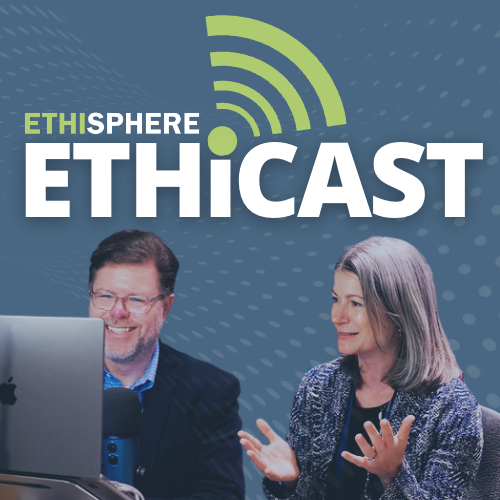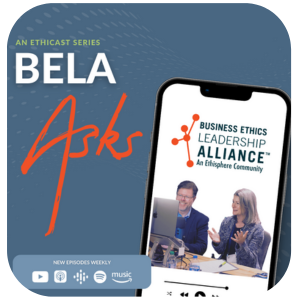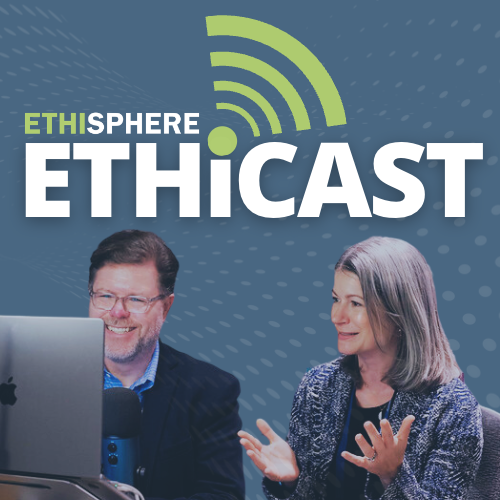Episode Transcript
[00:00:00] Speaker A: Hi, everyone. You've got questions and we've got answers. Welcome to another Bella Asks episode of the Ethicast.
The Business Ethics Leadership alliance, or bela, is a global ethics and compliance community that provides exclusive access to helpful data, best benchmarking events and other resources to advance your ethics and compliance program.
One of these resources is Bella's Concierge service, in which members can submit any question regarding ethics and compliance and our internal experts will provide an answer, plus helpful resources with more information.
Now, while we invite everyone watching and listening to join Bella, we know that there's also no competition in compliance. That's why we're using this program to thematically respond to high level questions from the Bella community for the benefit of ENC teams everywhere.
Joining us once again to answer those questions is Bella chair Erica Salmon Byrne. Erica, thank you so much for returning to the program. It's good to see you, Bill.
[00:01:03] Speaker B: It's great to see you. I'm so happy that the question, well, never runs dry.
[00:01:08] Speaker A: It never does. And our next question is a culture question and it reads, how do we revisit or transform our core values? That's a big question for a few words.
[00:01:19] Speaker B: It's a bit. Is a big question.
And you know, we've categorized this as a culture question. And for those of you listening in who wonder, you know, why, Bill always says, like, this is an X question. That's how we taxonomize questions on our side when we get them in so that we can kind of track and trend and see what the Bell community is thinking about at any given point. But this one, Bill, this is a, this is a culture question. This is a meta question. Like, this is a, this is a big question.
And, and I've given this one a lot of thought since I saw it come in from the community because I know the member that asked this particular question and she is in a spot where her company is going through a fair amount of transition. They've got some new leadership, she's relatively new to the organization, and there's an opportunity that has been identified to take a step back and really think about the animating principles that the company uses to explain to employees why it exists in the first place.
And so I think it's important to set that little bit of context because it is about that transition moment.
How are you going to think about using values, language that becomes a set of rails within which everything else is going to operate? That's what good values do.
They are a marketing opportunity to future employees. They are a conversation starter with Business partners or customers. They are a way of gathering and consolidating the things you think about, motivating you on a day to day basis for your existing employee base. So they can be extraordinarily impactful.
They're often a plaque on the wall or maybe a screensaver or does anybody use mouse pads anymore?
They are often something that is underutilized.
So I love this question, even though it's going to be a hard one to fit into our traditional less than 10 minute length for. Bella asks, because it, it indicates to me that this is somebody who is really thinking strategically about how to use something like values. So what does it look like to do this development work and what does it look like to do it? Well, a couple of pieces of advice.
One is think about your origin story as an organization. Why do you exist? What is the problem in the universe that you are trying to solve? Who is the audience that you are looking to reach? What is the purpose of the work that you do? That is the basis of your social license to operate and that should be the basis of any values based work that you do.
Second thing is, know your audience. Who are you developing values for? Are you going to use these in external marketing? Are they going on the website? Are you going to use them to structure your code of conduct? Are they going to be guidance that underpins your policy work? What are you going to do with the values? Are you going to use them to structure your performance review process? Are you going to build them into your recognition programs? Right. What, what are you actually going to use these things for?
Because those two, answering those two questions is going to do two, two key things. One is make sure that you have the right people in the room when you start the drafting process and to make sure that you're building something that is actually usable. Because it is extraordinarily tempting to do this values work. Put it in the code of conduct, hang it on the wall, whatever, and then move on.
If you use the opportunity to think about your values strategically as a way of thinking about what animates your work in the first place, then you can have a more strategic dialogue. So those are just a couple pieces of advice that I would say. You know, think about your history, your purpose, what animates your work.
Think about who your audience is for the values language and then try to do something that feels like you.
That would be the last, the last thing that I would say is, you know, if, if, if I can look at your values and they're the same as every other organization in your space.
That probably means that you pick the right things to focus on, but it probably also means that they don't really sound like you.
[00:05:25] Speaker A: The ethics and compliance team are professionals that in many, many organizations are intimately familiar with the core values of an organization.
When I talk to organizations, especially like World's Most Ethical Companies honorees, they often talk about how their core values are part and parcel of why they're successful in the marketplace. You know, a lot of really great organizations, they talk about how those values drive them to success.
I'm wondering if, if ENC is in a place where they can help an organization revisit or transform those core values, given how much those core values can be a integral part of broad strategic success, this strikes me as a prime opportunity for how E and C can show to the entire organization how it brings value to the organization. Outside of simple risk management, what are your thoughts?
[00:06:16] Speaker B: Yeah, I, I think that, I mean, first off, the fact that this particular Bella member is involved is asking the question means that they are involved in the conversation about what the values are going to look like going forward. So that's great.
But yeah, I, I think, I think you raise a really good point, Bill, which is when I think about people who are going to use the values, the, the ethics and compliance team is right at the front of the line. Right. They're right there with talent management, you know, people management, maybe investor relations. Right. There's sort of that, that whole kind of second line of defense group is the group that's really going to think about using these values and using them to, to have a cohesive type of messaging to employees, using them to, to really focus on the things that matter to the business. To, to make strategic prioritization, particularly in challenging situations where resources might be limited.
There's so many different use cases for a strong set of, of, of, of corporate values. So I do think there's an intimately important role for ENC to play in the development process and as a stakeholder that is actually going to use the values.
If there's a values conversation that's going on at the C suite level that you're not currently part of, raise your hand and say, you know what? Hey guys, I actually use these on an ongoing basis or I want to use these, or I wish I could use these if they were better. Right.
And lean into that because it is a way of linking, linking the things that supposedly animate the business to the work that you do on a day to day basis.
[00:07:50] Speaker A: Well, Erica, as always, really appreciate you coming in and offering your insights on these questions. I know our members of the community are so grateful that you come in and do this. So once again, thanks so much for coming in.
[00:08:00] Speaker B: Oh Bill, 100% my pleasure. Great. Questions like this are honestly the best part of our jobs. So happy to be here.
[00:08:07] Speaker A: To learn more about Bella, Visit@the sphere.com Bella to request guest access to the Member Resource Hub and to speak with the Bella Engagement Director. If you have a question that you would like answered on this program, contact the Bella Concierge Service and we'll get to work on it for you. This has been another Bella Asks episode of the Ethicast. Thanks for joining us. We hope you've enjoyed the show. If you haven't already, please like and subscribe on YouTube, Apple Podcasts and Spotify. And be sure to tell a colleague about us as well. It really helps the program.
That's all for now, but until next time, remember, strong ethics is good business.


